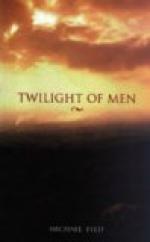He leapt to his feet. Without a second thought he moved over to the door and flung it wide.
“What the—?” He broke off. “Good God!” he cried. “You, Father?” He laughed. “Why I thought it was some of the Bolshies from down at the mill.”
He withdrew the gun from his coat pocket in explanation. Then he stood aside.
“Will you come right in?”
The man Bull had discovered made no answer. But as he stood aside, tall, clad in heavy fur from head to foot, Father Adam strode into the room.
Bull watched him with questioning eyes. Then he closed the door and his visitor turned confronting him in the yellow lamplight.
“I’ve made more than a hundred miles to get you to-night,” Father Adam said.
Then he flung back the fur hood from his head, and ran a hand over his long black hair, smoothing it thoughtfully.
“Yes?”
Bull’s eyes were still questioning.
“Won’t you shed your furs and sit?” he went on. “The Chink’s abed, but I’ll dig him out. You must get food.”
The other glanced round the pleasant office, and his eyes paused for a moment at the chair at the desk.
“Food don’t worry, thanks,” he said, his mildly smiling eyes coming back to his host’s face. “I’ve eaten—ten miles back. I rested the dogs there, too. I’ve maybe a ha’f hour to tell you the thing I came for. There’s trouble in the woods. Bad trouble. If it’s not straightened out, why, it looks like all work at your mills’ll quit, and you’re going to get your forest limits burnt out stark.”
CHAPTER XIX
THE HOLD-UP
Ole Porson took a final glance round his shanty. The last of the daylight was rapidly fading. There was still sufficient penetrating the begrimed double window, however, to reveal the littered, unswept condition of the place. But he saw none of it. It was the place he knew and understood. It was at once his office, and his living quarters; a shanty with a tumbled sleeping bunk, a wood stove, and a table littered with the books and papers of his No. 10 camp. He was a rough creature, as hard of soul as he was of head, who could never have found joy in surroundings of better condition.
He solemnly loaded the chambers of a pair of heavy guns. Then he bestowed them in the capacious pockets of his fur pea-jacket. He also dropped in beside them a handful of spare cartridges. In his lighter moments he was apt to say that these weapons were his only friends. And those who knew him best readily agreed. Drawing up the storm-collar about his face, he passed out into the snow which was falling in flakes the size of autumn leaves. There was not a breath of wind to disturb the deathly stillness of the winter night.
Minutes later he was lounging heavily against the rough planked counter of Abe Risdon’s store. He was talking to the suttler over a deep “four-fingers” of neat Rye, while his searching eyes scanned the body of the ill-lit room. The place was usually crowded with drinkers when the daylight passed, but just now it was almost empty.




